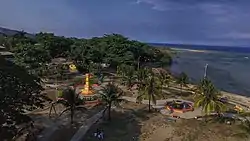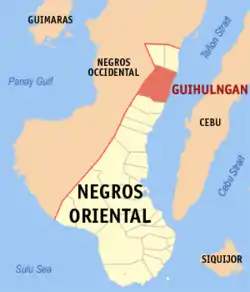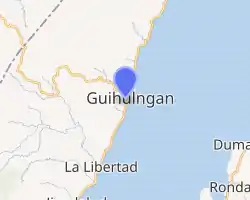Guihulngan
Guihulngan, officially the City of Guihulngan (Cebuano: Dakbayan sa Guihulngan; Tagalog: Lungsod ng Guihulngan; Spanish: Ciudad de Guijúlñgan), is a 5th class component city in the province of Negros Oriental, Philippines. According to the 2015 census, it has a population of 95,969 people, [3] the third-most populous city in Negros Oriental after the cities of Dumaguete and Bayawan. Guihulngan is also dubbed by its residents as the “rising city of the north”.
Guihulngan | |
|---|---|
| City of Guihulngan | |
 Guihulngan Rizal Freedom Park | |
 Seal | |
| Motto(s): Abanté Guihulngan! | |
 Map of Negros Oriental with Guihulngan highlighted | |
OpenStreetMap 
| |
.svg.png.webp) Guihulngan Location within the Philippines | |
| Coordinates: 10°07′N 123°16′E | |
| Country | |
| Region | Central Visayas (Region VII) |
| Province | Negros Oriental |
| District | 1st district |
| Barangays | 33 (see Barangays) |
| Government | |
| • Type | Sangguniang Panlungsod |
| • Mayor | Carlo Jorge Joan "Guido" L. Reyes |
| • Vice Mayor | Ernesto A. Reyes |
| • Representative | Jocelyn S. Limkaichong |
| • Electorate | 61,051 voters (2019) |
| Area | |
| • Total | 388.56 km2 (150.02 sq mi) |
| Elevation | 194 m (636 ft) |
| Population | |
| • Total | 95,969 |
| • Density | 250/km2 (640/sq mi) |
| • Households | 22,324 |
| Economy | |
| • Income class | 5th city income class |
| • Poverty incidence | 54.04% (2015)[4] |
| • Revenue | ₱556,025,049.36 (2016) |
| Time zone | UTC+8 (PST) |
| ZIP code | 6214 |
| PSGC | |
| IDD : area code | +63 (0)34 |
| Climate type | tropical climate |
| Native languages | Cebuano Tagalog |
| Website | www |
Etymology
There are several versions of how the city derived its name. The first, according to old tales, was attributed to a river flowing directly to the town proper from the mainspring in sitio Anahaw, Barangay Nagsaha, hence the name "GUIPADULNGAN" which means the point where the river flows to an end.
Some of the towns of early creation were founded at the close of the 18th century and the beginning of the 19th century. Dauin, for example, was founded in 1787, Tayasan, in 1790; Jimalalud, in 1797; Guijulñgan, in 1800; and Bacong, in 1801.[5]
As constituted in 1898, it included the following towns: Amblan, Ayungon, Ayuquitan, Bacong, Bais, Bayanan, Canoan, Dauin, Dumaguete (capital), Guijulñgan, Manjuyod, Nueva Valencia, Siaton, Tanjay, Tayasan, Tolon, and Zamboanguita.[6]
The second is associated with the gruesome incident in the 19th Century when the Philippines was a colony of Spain; men and women of different ages were said to be captured, beheaded and thrown into the sea by the Moros, now known as Tañon Strait. Other accounts claim that the Moro invaders dropped a bell into the sea when they found out that it was used by the lookout to warn the townsfolk of their coming. Since that time, the place has been called "GUIHULUGAN" which means, "Place where a thing was dropped". But in the Spanish writing, "U" and "N" are similar, which is why it became commonly written and known as GUIHULNGAN.
Whether it originated as "GUIPADULNGAN" or "GUIHULNGAN", the name is indeed symbolic, as the town is “dropped” with abundant blessings from the Almighty for a significant "end".[7]
In 17th century map Murillo-Velarde Map it somewhat appears as "Dijolongan".
History
- Cityhood
Guihulngan was already the largest municipality in Negros Oriental when, in July 2007, a popular referendum was passed declaring it a city.[8]
Geography
Guihulngan is located in the northern part of the province on the coast of Tañon Strait.
Barangays
Guihulngan is politically subdivided into 33 barangays.
- Bakid
- Balogo
- Banwague
- Basak
- Binobohan
- Buenavista
- Bulado
- Calamba
- Calupa-an
- Hibaiyo
- Hilaitan
- Hinakpan
- Humayhumay
- Imelda
- Kagawasan
- Linantuyan
- Luz
- Mabunga
- Mckinley
- Nagsaha
- Magsaysay
- Malusay
- Mani-ak
- Padre Zamora
- Plagatasanon
- Planas
- Poblacion
- Sandayao
- Tacpao
- Tinayunan Beach
- Tinayunan Hill
- Trinidad
- Villegas
Climate
| Climate data for Guihulngan City, Negros Oriental | |||||||||||||
|---|---|---|---|---|---|---|---|---|---|---|---|---|---|
| Month | Jan | Feb | Mar | Apr | May | Jun | Jul | Aug | Sep | Oct | Nov | Dec | Year |
| Average high °C (°F) | 29 (84) |
30 (86) |
31 (88) |
32 (90) |
31 (88) |
30 (86) |
30 (86) |
30 (86) |
30 (86) |
30 (86) |
29 (84) |
29 (84) |
30 (86) |
| Average low °C (°F) | 23 (73) |
22 (72) |
23 (73) |
24 (75) |
25 (77) |
25 (77) |
25 (77) |
25 (77) |
25 (77) |
24 (75) |
24 (75) |
23 (73) |
24 (75) |
| Average precipitation mm (inches) | 42 (1.7) |
34 (1.3) |
40 (1.6) |
61 (2.4) |
124 (4.9) |
188 (7.4) |
190 (7.5) |
191 (7.5) |
189 (7.4) |
186 (7.3) |
124 (4.9) |
73 (2.9) |
1,442 (56.8) |
| Average rainy days | 10.0 | 8.5 | 9.5 | 12.8 | 22.3 | 26.8 | 28.4 | 27.9 | 27.3 | 27.6 | 20.5 | 13.1 | 234.7 |
| Source: Meteoblue (Use with caution: this is modeled/calculated data, not measured locally.) [9] | |||||||||||||
Demographics
|
| ||||||||||||||||||||||||||||||||||||||||||||||||
| Source: Philippine Statistics Authority [3] [10] [11][12] | |||||||||||||||||||||||||||||||||||||||||||||||||
Landmarks
A huge bell with a Carabao was served as the main attraction of the city located at the side of Justice Hall along the National Highway.
Festival
Cara-Bell Festival (Every 24 May) – Legend has it that marauding pirates used to slaughter natives of the town and drop their corpses into the sea. Guihulugan Festival of Guihulngan is usually celebrated on the 24th of May. This festival is also referred to as the Cara-Bell Festival because of a story about a bell that saved the lives of the natives. According to some legends of the olden days, Moro pirates sailed the lands of Negros Oriental.
Transportation
Mactan–Cebu International Airport is the closest major airport to Guihulngan, although it is located in Cebu. Fast ferries connect Guihulngan to Cebu via Tangil Port in Dumanjug. Alternatively, there are flights from Cebu and Manila to Dumaguete Airport, from where buses run from Dumaguete City to Guihulngan, 120 kilometres (75 mi) north. Buses also connect Guihulngan to nearby San Carlos City.
Education
Negros Oriental State University, the only state university in the province of Negros Oriental has a satellite campus in the city. It is known as the Guihulngan City Campus
St. Francis College Guihulngan (SFC-G) is a private institution located in Bateria, Guihulngan, Negros Oriental. Inspired by the Charism of St. Francis of Asissi, it was founded by three Franciscan friars.
References
- City of Guihulngan | (DILG)
- "Province:". PSGC Interactive. Quezon City, Philippines: Philippine Statistics Authority. Retrieved 12 November 2016.
- Census of Population (2015). "Region VII (Central Visayas)". Total Population by Province, City, Municipality and Barangay. PSA. Retrieved 20 June 2016.
- "PSA releases the 2015 Municipal and City Level Poverty Estimates". Quezon City, Philippines. Retrieved 12 October 2019.
- Felipe, Buencamino. "Census of the Philippine Islands taken under the direction of the Philippine Legislature in the year 1918". Publisher Manila, Bureau of printing. OCLC 1041773123. Cite journal requires
|journal=(help) - Felipe, Buencamino. "Census of the Philippine Islands taken under the direction of the Philippine Legislature in the year 1918". Publisher Manila, Bureau of printing. OCLC 1041773123. Cite journal requires
|journal=(help) - "Guihulngan - Inside Negros". Archived from the original on 2012-02-10. Retrieved 2012-02-21.
- Gallarde, Juancho (July 17, 2007). "Guihulgnan becomes sixth city of NegOr". Visayan Daily Star. Retrieved July 28, 2009.
- "Guihulngan: Average Temperatures and Rainfall". Meteoblue. Retrieved 6 May 2020.
- Census of Population and Housing (2010). "Region VII (Central Visayas)". Total Population by Province, City, Municipality and Barangay. NSO. Retrieved 29 June 2016.
- Censuses of Population (1903–2007). "Region VII (Central Visayas)". Table 1. Population Enumerated in Various Censuses by Province/Highly Urbanized City: 1903 to 2007. NSO.
- "Province of". Municipality Population Data. Local Water Utilities Administration Research Division. Retrieved 17 December 2016.
External links
| Wikimedia Commons has media related to Guihulngan. |
| Wikivoyage has a travel guide for Guihulngan. |